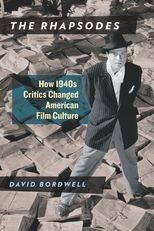The Rhapsodes: How 1940s Critics Changed American Film Culture
The Rhapsodes: How 1940s Critics Changed American Film Culture
Cite
Abstract
Four American film critics of the 1940s—Otis Ferguson, James Agee, Manny Farber, and Parker Tyler—changed the way Hollywood cinema was understood. They also wrote idiosyncratic, multi-flavored prose that constituted a new kind of arts journalism. This book considers their writing styles, their conceptions of film, their intellectual sources, their quarrels, and their impact on later generations of film writers. Ferguson believed that Hollywood cinema had created a new medium of dynamic, engaging storytelling—one that had a power of arousal found in jazz and swing music. Agee saw Hollywood as a source of poetic revelation beyond what literature could create. Manny Farber considered cinema a form of pictorial art that, in an age praising Abstract Expressionism, could revive supposedly outdated concepts like “illusion” and “illustration.” And Tyler brought a surrealist eye to cinema, discovering in “the Hollywood Hallucination” a repository of wild and piquant fantasies. All asked the reader scrutinize what was on the screen with an intensity not previously seen in popular reviewing. Rediscovered in the 1960s and 1970s, these critics had a robust influence on a later generation of film critics, including Pauline Kael, Andrew Sarris, and Roger Ebert.
Sign in
Personal account
- Sign in with email/username & password
- Get email alerts
- Save searches
- Purchase content
- Activate your purchase/trial code
Institutional access
-
Sign in through your institution
- Sign in with a library card Sign in with username/password Recommend to your librarian
Institutional account management
Sign in as administratorPurchase
Our books are available by subscription or purchase to libraries and institutions.
Purchasing information| Month: | Total Views: |
|---|---|
| November 2022 | 1 |
| November 2022 | 1 |
| November 2022 | 1 |
| November 2022 | 1 |
| November 2022 | 1 |
| November 2022 | 4 |
| November 2022 | 1 |
| November 2022 | 1 |
| January 2023 | 2 |
| February 2023 | 2 |
| March 2023 | 6 |
| August 2023 | 1 |
| September 2023 | 1 |
| September 2023 | 1 |
| October 2023 | 1 |
| December 2023 | 2 |
| December 2023 | 2 |
| December 2023 | 2 |
| December 2023 | 2 |
| December 2023 | 2 |
| December 2023 | 2 |
| December 2023 | 2 |
| December 2023 | 2 |
| December 2023 | 2 |
| January 2024 | 1 |
| February 2024 | 1 |
| March 2024 | 1 |
| March 2024 | 2 |
| March 2024 | 4 |
| April 2024 | 1 |
| April 2024 | 5 |
| April 2024 | 1 |
| April 2024 | 1 |
| April 2024 | 2 |
| April 2024 | 3 |
| April 2024 | 5 |
| April 2024 | 1 |



Get help with access
Institutional access
Access to content on Oxford Academic is often provided through institutional subscriptions and purchases. If you are a member of an institution with an active account, you may be able to access content in one of the following ways:
IP based access
Typically, access is provided across an institutional network to a range of IP addresses. This authentication occurs automatically, and it is not possible to sign out of an IP authenticated account.
Sign in through your institution
Choose this option to get remote access when outside your institution. Shibboleth/Open Athens technology is used to provide single sign-on between your institution’s website and Oxford Academic.
If your institution is not listed or you cannot sign in to your institution’s website, please contact your librarian or administrator.
Sign in with a library card
Enter your library card number to sign in. If you cannot sign in, please contact your librarian.
Society Members
Society member access to a journal is achieved in one of the following ways:
Sign in through society site
Many societies offer single sign-on between the society website and Oxford Academic. If you see ‘Sign in through society site’ in the sign in pane within a journal:
If you do not have a society account or have forgotten your username or password, please contact your society.
Sign in using a personal account
Some societies use Oxford Academic personal accounts to provide access to their members. See below.
Personal account
A personal account can be used to get email alerts, save searches, purchase content, and activate subscriptions.
Some societies use Oxford Academic personal accounts to provide access to their members.
Viewing your signed in accounts
Click the account icon in the top right to:
Signed in but can't access content
Oxford Academic is home to a wide variety of products. The institutional subscription may not cover the content that you are trying to access. If you believe you should have access to that content, please contact your librarian.
Institutional account management
For librarians and administrators, your personal account also provides access to institutional account management. Here you will find options to view and activate subscriptions, manage institutional settings and access options, access usage statistics, and more.